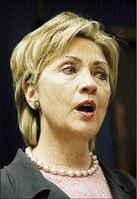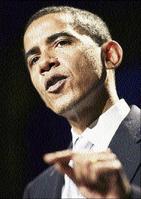
Edward SeagaThe political race between two US senators, Hillary Clinton and Barack Obama, for the nomination of the Democratic Party to contest the US presidential election in November, is buzzing with the excitement of a neck-and-neck two-horse race with the second horse taking over the lead from the first.
The two contestants are very different from each other, but in some ways they have similarities.
Hillary Clinton is a former first lady, wife of former President Bill Clinton. She is a senator who is seeking to become the first female president of the United States.
Barack Obama is an African American, son of a Kenyan father and American mother. He is a senator who is seeking to become the first of his race to be elected as president of the United States.
Both are attorneys by profession and both married attorneys they met in law school. The Obamas both attended and graduated from the best law school in America, the Harvard Law School. The Clintons did the same at Yale which is not far behind the reputation of Harvard. This positions the two couples in the middle of the most renowned classical college rivalry in America - Harvard/Yale, adding a little spice to the contest.
But deeper socio-political differences exist. Clinton is a white woman who, in the setting of the historic racial prejudices of the American society, should be a clear favourite. The "race card" has been a historic determinant in voting preferences at this level. But in the presidential contest of 2002, Colin Powell, former US secretary of state, a black man with Jamaican roots, was a favourite in the polls, until he decided against contesting, because of a fear of assassination, it was said. So maybe the "race card" has not been as strong as assumed and a change in race relations has been taking place without being fully recognised. If so, this would be a great development. Maybe it took Barack Obama to bring this out into the open. But this won't be fully known until Obama faces the southern horde of Republican voters many of whom normally vote along racial lines.
Hillary Clinton has much political experience; Barack Obama does not. She has policies which she presents without excitement. Obama has a populist leaning which he presents in a more exciting package. The contrast is between sound and sober arguments, on the one hand, and charismatic presentations which can cast a spell of visions to fill dreams with hope.
most important factor


U.S. presidential hopeful Senator Hillary Clinton and United States Senator Barack Obama - File photos
None of this scenario, however, has fully taken into account the expected condition of the US economy over the next few years. This is perhaps the most important factor in the race.
The American economy is not on the mend. There is nothing that suggests that a recession can be avoided unless the recent package of tax rebates approved by President Bush works, or the fall-out in the economy works its way out without too much damage.
Ronald Reagan, faced with the worst recession in 50 years, used the same tax rebate strategy to restore stability to the economy at the beginning of the 1980s and it worked then. So maybe this recession will go the same route. It is now a question of wait and see.
But there is a big difference this time. The destabilising factor is not just the huge sub-prime mortgages (bad loans) which are weighing down the financial system in America and also across the globe. This time there are two other factors - the frightening escalation in the price of oil and the reduced inflows of foreign investment into the US because of the depreciation of the US dollar which reduces investor returns. The American economy depends on foreign inflows to provide financial liquidity to support consumer spending, since US savings are traditionally very low. If consumer spending falls, economic growth will decrease because of the extent to which consumption drives the economy.
The bottom line is that the US dollar has to be depreciated in the American economy to provide a competitive edge against Chinese goods for the improvement of export earnings, but it also has to keep the value of the dollar strong to attract foreign inflows. Damned if you do; damned if you don't !
As far as the escalating price of oil, another driver of the economy, is concerned, the solution so far has been to switch from oil to ethanol produced from sugar-based or cereal crops. But this is no real solution. If all the land available in the US capable of planting corn were to be put into corn production, it would only suffice as a substitute for 12 per cent of US demand for oil. It appears that a network of nuclear power stations could be only real solution, as has been done in France. But this has not been a popular option in the US.
increased food prices
A further problem is that the switch to ethanol causes increased food prices and, consequentially, inflation, which is another sensitive barometer of economic health.
What do the candidates say about this interlocking web of conflicting economic factors? Unbelievably, they are promising to make the United States self-sufficient in energy, and are competing with each other as to who can offer more health care and a bigger minimum wage. None of them is saying that solving the crisis will require fundamental structural adjustment of the US economy to improve savings in order to reduce dependency on foreign inflows. None are talking about the reduced standard of living which Americans will have to endure, or the lay-offs to reduce expenditure. Welcome to Jamaican politics!
A destabilised American economy would be catastrophic to Jamaica at this time - higher food prices, increased inflation, reduced bauxite/alumina export earnings, decreased tourists inflows. This spells lower growth, less employment, cuts in welfare benefits and increased crime.
S the US economy concerns American citizens, it concerns Jamaicans and the rest of the world too because of the devastation it can cause. It appears that this is a time for decisions of the mind, not the heart. Welcome to the Jamaica of the 1970s and 1980s - déjà vu.
Edward Seaga is a former prime minister. He is now a distinguished fellow at the UWI. E-mail: odf@uwimona.edu.jm

